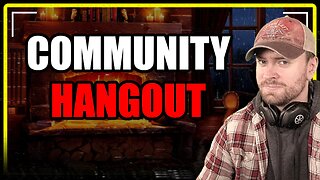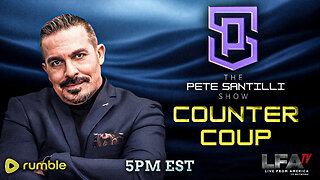Premium Only Content

Spyglass & Secrets: Can Transparency and Security Coexist?
#TransparencyVsSecurity #SurveillanceDebate #PrivacyMatters #NationalSecurity #OpenGovernment #DataPrivacy #Spycraft #DigitalRights #new #vlog #podcast #newvideo
Picture the ideal democracy: every blinking camera and keyword scan declared in living neon signs, while our national security remains unscathed. Sounds about as plausible as a vegan steak. The public clamors for transparency, who wouldn’t want to know if Big Brother skipped brunch to snoop on their group chat? Meanwhile, security agencies whisper, “Trust us,” while handing us a blank scroll for our trust fall. So the real question is: can a government simultaneously brag about its openness and keep its secrets under lock and key?
Advocates of transparency argue that sunlight is the best disinfectant, if we shine a spotlight on the surveillance apparatus, maybe it’ll stop infecting civil liberties. Imagine government reports so clear you could read them in the bath, annotated with memos on why Agent 47 monitored your cat videos. Oversight hearings would replace conspiracy forums, and whistleblowers might become prime-time guests instead of nightly fugitives. Nothing says democracy like a public Q&A where spooks explain their wiretaps with pop quizzes. Accountability would spike like viral tweets, everyone loves a scandal, as long as it’s someone else’s metadata on the line.
On the flip side, national security officials prefer cloak-and-dagger theatrics to PBS documentaries. They insist some secrets must stay… well, secret, or else we’d tiphand the villains faster than a Netflix spoiler. If terrorists can join your Sunday group chat, so can our intelligence failures. Asking spies to blog their findings is like asking a ninja to conduct a cooking show, technically possible, but terribly counterproductive. So while we dream of open-source espionage, they dream of open firewalls.
Maybe the answer lies in a halfway house for secrecy: selective transparency. Declassified summaries with redacted footnotes, quarterly oversight with sarcasm-deterring fines, and independent watchdogs armed with coffee and subpoenas. We could establish a “no-spy zone” for basic privacy, then let the intel agencies keep their trading cards under lock and key. It’s a compromise that feels like trusting a fox to guard the henhouse, dubious, but surprisingly effective if you keep the door locked.
In the end, transparency and national security are like oil and water, awkward at intimate dinners, but with enough shaking they form a tolerable vinaigrette. Governments can parade sanitized dashboards and tout transparency metrics while still hiding the really juicy stuff behind classified clearance. Citizens get their daily dose of oversight memes, and agencies preserve their covert capers for late-night documentaries. Neither side walks away entirely happy, but at least they pretend to hold hands for the cameras. And in politics, pretending is half the battle.
-
 14:51
14:51
Rethinking the Dollar
7 hours agoSilver Price Crash? Why You’re Still Paying $60+ for Eagles
4.82K7 -
 LIVE
LIVE
The Amber May Show
2 hours agoSlacker82Alpha| SPECIAL GUEST RENOWNED UFO EXPERT STAN DEYO
39 watching -
 LIVE
LIVE
MattMorseTV
3 hours ago $5.32 earned🔴Community Hangout🔴
429 watching -
 LIVE
LIVE
Tundra Tactical
4 hours ago $2.52 earnedThe Great Tundra Nation Gaming Stream!!! Featuring ThePiggNation LAST DAY!!!!
103 watching -
 2:38:50
2:38:50
The Rabble Wrangler
4 hours agoThe Best in the West | Live From Rumble Studios
23.8K -
 16:55
16:55
Bearing
10 hours agoHasan Piker’s EPIC MELTDOWN 💥 F**k My Audience, F**k Streaming, F**k Socialism 🤬
14.6K21 -
 LIVE
LIVE
LFA TV
19 hours agoLIVE & BREAKING NEWS! | TUESDAY 10/21/25
855 watching -
 1:08:55
1:08:55
vivafrei
1 day agoExposing the Trans MADNESS in Maine School Boards! Live with Activist and Truth Teller "Corn Pop"!
116K26 -
 1:50:18
1:50:18
The Quartering
5 hours agoWhat The Heck Is Even Happening?
116K26 -
 1:16:59
1:16:59
iCkEdMeL
4 hours ago $7.24 earnedICE SHOOTS Popular TikToker ‘Richard’ During Raid in South L.A.?! 😳 What Really Happened LIVE
35.1K16